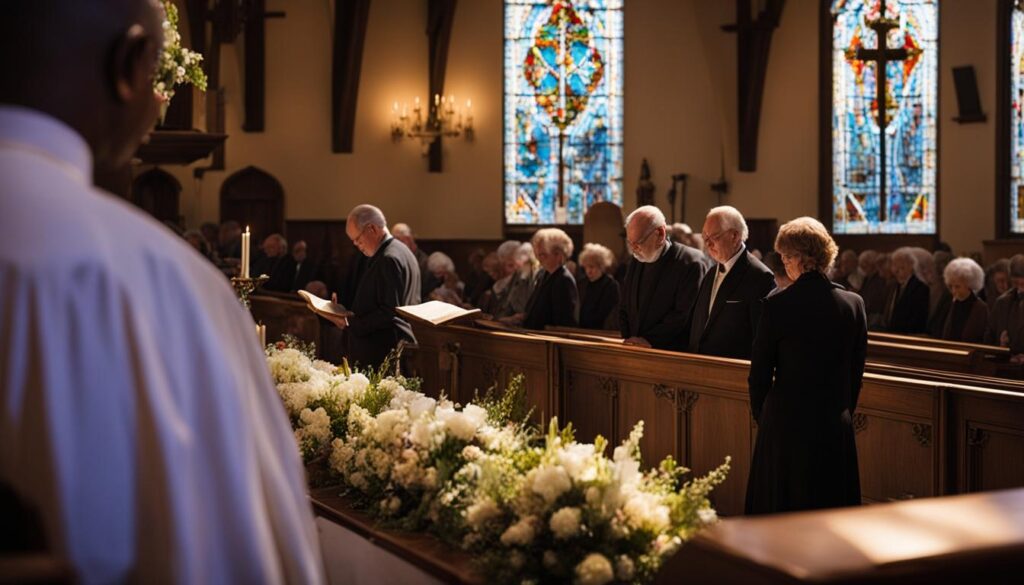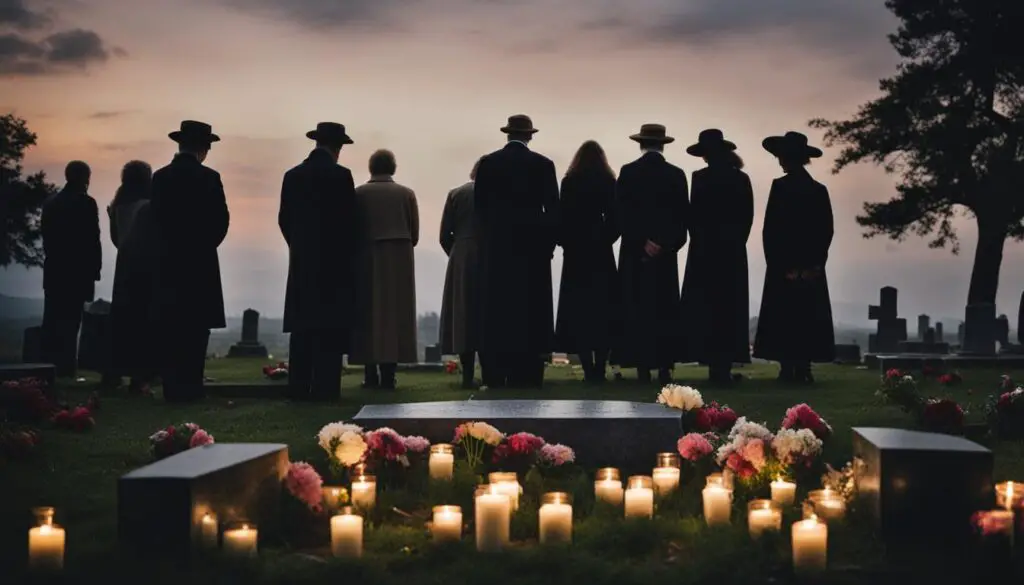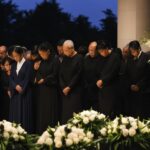Finding solace and comfort in the midst of loss is a crucial part of the funeral ceremony. Funeral prayers, whether religious or non-religious, offer a means of connecting with a higher power and expressing gratitude for the life of the departed. In this article, we will explore various funeral prayers and blessings that can provide comfort and hope during times of mourning.
Key Takeaways:
- Funeral prayers can offer comfort, solace, and a sense of connection with a higher power during times of loss.
- Christian funeral prayers often include the Lord’s Prayer and other prayers of comfort and support.
- Islamic funeral prayers, known as Salat al-Janazah, seek forgiveness and mercy from Allah for the deceased.
- Non-religious funeral blessings focus on the celebration of life and the continuation of love even after death.
- Specific prayers can be recited for different situations, such as a funeral prayer for a loved one or a funeral prayer for a child.
Traditional Christian Funeral Prayers
Christian funeral prayers hold a special place in the hearts of those who follow the Christian faith. These prayers serve as a way to express devotion to God and seek comfort during times of grief and loss. The Lord’s Prayer, also known as the Our Father, is a well-known and frequently recited prayer in Christian funeral ceremonies. This prayer, taught by Jesus to his disciples, encompasses themes of trust, forgiveness, and seeking God’s will. It provides solace and a sense of peace to both the grieving family and those in attendance.
Alongside the Lord’s Prayer, other prayers and blessings are often incorporated into Christian funeral services. These prayers may include expressions of gratitude for the life of the deceased, requests for God’s comfort and guidance, and prayers for eternal peace for the departed soul. They offer support and reassurance to the mourning family, reminding them of the presence and love of God in their lives.
Christian funeral prayer guides are available to help individuals and clergy in selecting appropriate prayers for the funeral service. These guides provide a collection of prayers that align with Christian beliefs and can be tailored to suit the specific needs and preferences of the deceased and their family. They serve as a valuable resource in creating a meaningful and comforting ceremony that honors the life of the departed.

Table: Examples of Christian Funeral Prayers
| Prayer | Meaning |
|---|---|
| The Lord’s Prayer | A prayer taught by Jesus, expressing trust in God’s guidance and seeking forgiveness. |
| Prayer for Comfort | A prayer asking for God’s consolation and peace during times of sorrow. |
| Prayer of Thanksgiving | A prayer expressing gratitude for the life of the deceased and the memories shared. |
| Prayer for Eternal Rest | A prayer seeking God’s eternal peace for the departed soul. |
Christian funeral prayers offer reassurance, hope, and a deep connection to faith in times of mourning. They provide a way for the grieving family and community to come together, seek comfort in God’s presence, and honor the life of the departed. Whether through reciting the Lord’s Prayer or selecting other prayers and blessings, these heartfelt expressions of devotion and love offer solace and support during the funeral ceremony.
Islamic Funeral Prayers
In Islamic traditions, funeral prayers play a crucial role in honoring the deceased and offering support and comfort to their loved ones. The Islamic funeral prayer, known as Salat al-Janazah, is a ritual performed in congregation, emphasizing the communal nature of mourning and seeking solace from Allah.
The Islamic funeral prayer consists of a specific sequence of standing, bowing, and prostration, following the teachings of the Quran and the traditions of Prophet Muhammad. It is a time for believers to seek forgiveness and mercy for the departed soul and to express their heartfelt condolences to the grieving family.
Islamic funeral prayers serve as a reminder of the transience of life and the belief in the eternal soul. They offer a way to connect with the divine and find solace in the face of loss. These prayers are recited with the intention of seeking God’s mercy and forgiveness for the deceased, as well as providing support and comfort to the bereaved.

The Importance of Collective Prayer
In Islamic funeral prayers, the congregation comes together to offer support and condolences to the family of the deceased. This collective prayer serves as a powerful reminder of the unity and strength of the community, as well as the shared responsibility to support one another during times of grief.
“Verily, from Allah do we come and to Him is our return.” – Quran 2:156
The recitation of Quranic verses and supplications during the funeral prayer provides a source of comfort, reminding the attendees of the eternal nature of the soul and the hope for divine mercy and forgiveness. It is a time for reflection and remembrance, as well as an opportunity to express gratitude for the life of the deceased and seek blessings for their soul.
Islamic funeral prayers are a sacred tradition that offers solace, support, and unity to the grieving community. They serve as a reminder of the temporary nature of this world and the belief in the eternal life hereafter. Through these prayers, believers find comfort and strength during a time of loss, relying on the mercy and guidance of Allah.
Non-Religious Funeral Blessings
Non-religious funeral blessings offer a meaningful way to provide comfort and support to the grieving family without invoking any specific religious beliefs. These blessings acknowledge the loss and provide solace by focusing on the celebration of life, the importance of memories, and the enduring power of love.
One example of a non-religious funeral blessing is:
“May the memories we shared bring us comfort and the love we felt remain in our hearts forever. May we find solace in knowing that [name of deceased] lived a life filled with love and touched the lives of those around them. In our grief, let us remember the joy they brought and find strength in the love that binds us.”
This blessing encapsulates the essence of a non-religious approach, emphasizing the importance of memories and highlighting the impact the deceased had on their loved ones. It offers words of solace and hope, reminding the grieving family to find strength in the love they shared and the memories they will forever hold dear.
Sample Non-Religious Funeral Blessing
Another non-religious funeral blessing may be:
“In this time of sadness, let us find solace in the bond we shared with [name of deceased]. Though they may no longer walk beside us, their spirit lives on in our love, our memories, and the impact they had on our lives. May their light guide us through the darkness, reminding us to cherish every moment and to find peace in the beauty of life itself.”
This blessing acknowledges the grief and loss while encouraging the mourners to find solace in the enduring spirit of the deceased. It emphasizes the importance of cherishing each moment and finding peace in the beauty and preciousness of life.
| Blessing | Description |
|---|---|
| May the memories we shared bring us comfort | Emphasizes the importance of memories in finding solace |
| the love we felt remain in our hearts forever | Highlights the enduring power of love |
| May we find solace in knowing that [name of deceased] lived a life filled with love | Recognizes the impact the deceased had on others’ lives |
| In our grief, let us remember the joy they brought | Encourages finding strength in the love and joy shared |
Funeral Prayers for Specific Situations
In addition to the general prayers and blessings that can be recited at funerals, there are also specific prayers that can be adapted to different situations. These prayers address the unique circumstances surrounding the funeral and offer words of solace, comfort, and hope. Here are two examples of funeral prayers for specific situations:
Funeral Prayer for a Loved One
“Dear God, we gather here today to honor and remember our beloved [Name]. We are grateful for the joy, love, and happiness that [he/she] brought into our lives. We thank you for the memories we shared and the impact [he/she] had on our hearts. Please wrap [his/her] soul in your eternal embrace and grant [him/her] peace. Help us find comfort in our sorrow and remind us that love never dies. Amen.”
Funeral Prayer for a Child
“O God, the Comforter of all hearts, we come before you with heavy hearts as we mourn the loss of this precious child. We ask that you embrace [his/her] innocent soul with your boundless love and grant [him/her] eternal peace. Comfort [his/her] family in their grief, giving them strength to carry on. Help them find solace in the knowledge that [he/she] is safe in your care. Guide them through this difficult journey and fill their hearts with hope. Amen.”
These funeral prayers acknowledge the unique circumstances of losing a loved one or a child and offer words of solace, gratitude, and hope. They can be recited during the funeral ceremony or included in funeral programs and memorial materials.

Table: Examples of Funeral Prayers for Specific Situations
| Funeral Prayer | Situation |
|---|---|
| For a Loved One | Expressing gratitude and honoring the impact of a loved one’s life |
| For a Child | Offering prayers for the soul of a child and providing comfort to the grieving family |
Funeral Poems as a Form of Prayer
Funeral poems offer a unique and heartfelt way to express emotions, memories, and love for the deceased. They can be considered a form of prayer, as they seek comfort, healing, and solace during a time of loss. Whether recited during the funeral ceremony or included in memorial materials, funeral poems provide a personal and meaningful tribute to honor the life of the departed.
These poems often reflect on the beauty of life, the memories shared, and the impact the deceased had on those around them. They offer words of inspiration, hope, and remembrance, providing support to the grieving family and friends. Funeral poems can be chosen to align with the personal beliefs and values of the family, offering a source of comfort in accordance with their unique perspective.
Just as different prayers hold significance in various religious and cultural traditions, funeral poems can also embody the beliefs and emotions of those who recite them. They can offer solace to both those with religious faith and those who seek a non-religious approach to mourning. With their poetic and evocative language, funeral poems bring together the power of words and emotions, serving as a form of prayer that brings comfort and healing to all who grieve.
Types of Funeral Poems
There is a wide range of funeral poems to choose from, each with its own unique style and message. Some popular types of funeral poems include:
- Elegies: These poems express deep sorrow and mourning for the deceased, often featuring reflective and melancholic tones.
- Tributes: These poems focus on celebrating the life and achievements of the departed, highlighting their positive qualities and the impact they had on others.
- Remembrance: These poems evoke memories and emotions associated with the deceased, capturing the essence of their personality, relationships, and experiences.
- Inspirational: These poems offer words of encouragement, hope, and comfort to the grieving family, providing support during a challenging time.
By selecting a funeral poem that resonates with their emotions and beliefs, families can create a poignant and meaningful tribute that honors the memory of their loved one. Whether written by renowned poets or crafted by family members, funeral poems offer a timeless way to pay homage and seek solace in the face of loss.
Choosing the Right Funeral Prayer or Blessing
When planning a funeral ceremony, selecting the appropriate prayer or blessing is an important decision. It is essential to consider the religious or spiritual beliefs of the deceased and their family, as well as the cultural and religious traditions that are meaningful to them. Funeral prayer services can provide guidance and support in choosing the right prayers or blessings for the funeral ceremony, ensuring that it reflects the personal values and beliefs of the family.
Whether the funeral is conducted in a religious or non-religious context, the chosen prayers or blessings should offer comfort, solace, and a sense of connection with a higher power. For those with religious beliefs, incorporating traditional prayers from their specific faith can provide a deep sense of spiritual support. Examples include the Lord’s Prayer for Christians or the Islamic funeral prayer (Salat al-Janazah).
However, for individuals and families who prefer a non-religious approach, non-religious funeral blessings can be a meaningful choice. These blessings focus on celebrating the life of the deceased, cherishing memories, and acknowledging the continuing love even after death. They can be personalized to reflect the unique values and beliefs of the family, offering a heartfelt tribute that resonates with all who are present.
Why Consult Funeral Prayer Services?
Funeral prayer services are experts in funeral traditions and ceremonies. They can provide valuable insights and recommendations on the appropriate prayers or blessings for different cultural and religious backgrounds. These services can help navigate the complexities of funeral customs and ensure that the chosen prayers or blessings are inclusive and respectful of all attendees.
Personalizing the Funeral Prayer
Regardless of the chosen prayer or blessing, it is essential to personalize it to bring comfort and meaning to the grieving family. Adding personal anecdotes, memories, or specific references can make the prayer more relatable and heartfelt. It is also essential to consider the tone and language used in the prayer, ensuring that it offers solace and support to those in attendance.
Conclusion
Funeral prayers and blessings are an integral part of the funeral ceremony, providing solace, comfort, and a sense of connection with a higher power. These prayers can be customized to reflect religious beliefs, personal values, and the unique circumstances of the funeral. Whether conducted in a religious or non-religious context, funeral prayers serve as a touching tribute to honor the life of the departed and bring solace to the grieving family.
Funeral traditions and practices vary across cultures and religions, but they share a common purpose – to offer support and healing during times of loss. Each prayer or blessing carries the intention to provide comfort, express gratitude, and offer hope for the future. It is important to consider the religious or spiritual beliefs of the deceased and their family when selecting the appropriate prayer or blessing. By taking into account cultural and religious traditions, a meaningful and comforting choice can be made.
As funeral ceremonies are deeply personal and unique, funeral prayer services may be available to assist in selecting the most fitting prayers or blessings. These services can provide guidance and support, ensuring that the chosen prayers align with the wishes and values of the family. Regardless of the specific prayers chosen, the ultimate goal is to create a meaningful and memorable ceremony that pays tribute to the life of the departed and provides solace and support to those left behind.
Funeral prayers and blessings are not only a source of comfort, but they also serve as a way to respect and honor the deceased. They offer a time for reflection, remembrance, and healing, bringing together loved ones to celebrate a life well-lived. In the midst of grief and loss, these prayers provide a sense of hope, reminding us that the memory and legacy of the departed will live on in our hearts and minds. Through the power of prayer, we find strength, comfort, and a connection to something greater than ourselves.
FAQ
What is the most beautiful prayer for a funeral?
The beauty of a funeral prayer is subjective and may vary depending on personal beliefs and preferences. It is recommended to choose a prayer or blessing that resonates with the deceased’s religious or spiritual beliefs and offers comfort and solace to the grieving family.
What are traditional Christian funeral prayers?
Traditional Christian funeral prayers often include the Lord’s Prayer, which is a well-known prayer in Christianity. Other prayers and blessings can be recited to honor the memory of the deceased and offer support to the grieving family, asking for God’s comfort, guidance, and eternal peace.
What are Islamic funeral prayers?
Islamic funeral prayers, also known as Salat al-Janazah, are an essential part of the funeral ceremony in Islamic traditions. These prayers seek forgiveness and mercy from Allah for the deceased, and they are performed in a specific manner, following the teachings of the Quran and the traditions of Prophet Muhammad.
Are there non-religious funeral blessings?
Yes, non-religious funeral blessings offer a way to provide comfort and support to the grieving family without invoking specific religious beliefs. These blessings often focus on the celebration of life, the importance of memories, and the continuation of love even after death. They can be personalized and tailored to reflect the values and beliefs of the family and the deceased.
Are there funeral prayers for specific situations?
Yes, funeral prayers can be tailored to specific situations. For example, a prayer for a loved one may express gratitude for the happiness they brought and the impact they had on others’ lives. A prayer for a child may ask for the child’s soul to be embraced by God’s love and for the family to find comfort in their sorrow. These prayers acknowledge the unique circumstances of the funeral and provide words of solace and hope.
Can funeral poems be considered prayers?
Yes, funeral poems can be considered a form of prayer as they offer a heartfelt tribute and seek comfort and healing. These poems can be recited during the funeral ceremony or included in funeral programs and memorial materials. They provide a unique and personal way to honor the life of the deceased and offer solace to the grieving family.
How do I choose the right funeral prayer or blessing?
When choosing a funeral prayer or blessing, it is important to consider the religious or spiritual beliefs of the deceased and their family. Taking into account cultural and religious traditions can help ensure that the prayer or blessing is meaningful and comforting for those in attendance. Funeral prayer services may be available to provide guidance and support in selecting the right prayers or blessings for the funeral ceremony.
What is the significance of funeral prayers and blessings?
Funeral prayers and blessings play a significant role in funeral ceremonies, providing comfort, solace, and a sense of connection with a higher power. These prayers can be tailored to reflect religious beliefs, personal values, and the unique circumstances of the funeral. Whether recited in a religious or non-religious context, funeral prayers offer a way to honor the life of the deceased and bring comfort to the grieving family.








